Unit 4 Dealing with problems Lesson 12 Generation Gap 课件1-优质公开课-北师大8下精品
初中八年级英语下册Unit 4 Dealing with Problems Lesson 10 Problem Page 第一课时

Problems
While-reading: Understand the task
Helping each other, to be problem solvers
If you want to help the students solve the problems, you can write a reply to give him/her some suggestions on the problems. Would you like to help
It’s common to be in low spirits sometimes but it’s unhealthy to often have bad moods. If you feel yourself getting angry, take ten deep breaths. It’ll help you cool down. If you’re feeling upset,
• Choose one member to be the speaker.
Post-reading: Show achievements.
Show Time
You surely can • One of group members give us a presentation about your reply.
group is useful and acceptable.
□
□
□
□
Homework
• Write a reply on the problem you chose. • Share your achievements next class.
(北师大版)义务教育课程标准实验教科书《英语》目录

(北师大版)义务教育课程标准实验教科书《英语》目录(北师大版)义务教育课程标准实验教科书《英语》目录七年级上册2013年7月第1版Unit 1 FamilyLesson 1 Photos of UsLesson 2 What Do They Look Like?Lesson 3 Happy Birthday!Unit 2 School LifeLesson 4 School ThingsLesson 5 Before ClassLesson 6 A School DayUnit 3 HomeLesson 7 Time to TidyLesson 8 Whose Ball Is This?Lesson 9 Near My HomeUnit 4 Interests and SkillsLesson 10 My InterestsLesson 11 A Skills SurveyLesson 12 China’s Got Talent七年级下册2013年12月第1版Unit 1 Daily LifeLesson 1 After SchoolLesson 2 A Dangerous JobLesson 3 Safety FirstUnit 2 On the WeekendLesson 4 Helping at HomeLesson 5 Talking to FriendsLesson 6 Going OutUnit 3 Food and DrinkLesson 7 Shopping for FoodLesson 8 At a RestaurantLesson 9 Food for SportUnit 4 Seasons and Weather Lesson 10 Weather in Beijing Lesson 11 Weather Around the World Lesson 12 Summer HolidayUnit 5 Now and ThenLesson 13 Changes in Our Town Lesson 14 My First DayLesson 15 My Favourite TeacherUnit 6 The Animal KingdomLesson 16 My Favourite Animal Lesson 17 Interesting Animals Lesson 18 An Animal Story八年级上册2014年7月第1版,2016年7月第3次印刷Unit 1 TelevisionLesson 1 Last Week on TVLesson 2 An Interview on TVLesson 3 The Big GameUnit 2 TeamsLesson 4 Class ProjectsLesson 5 TeamworkLesson 6 A Special TeamUnit 3 Faster, Higher, StrongerLesson 7 Time to ExerciseLesson 8 Olympic WinnersLesson 9 Never Give Up!Unit 4 Healthy LivingLesson 10 Going to the DoctorLesson 11 Health AdviceLesson 12 Healthy BonesUnit 5 HelpingLesson 13 Helping Your CommunityLesson 14 Helping Each OtherLesson 15 A Young HeroUnit 6 The UnexplainedLesson 16 Natural Abilities Lesson 17 True Stories?Lesson 18 Dreams八年级下册2014年12月第1版Unit 1 Technology and the Future Lesson 1 Schools of the Future Lesson 2 Online LifeLesson 3 Tomorrow's JobsUnit 2 CommunicationLesson 4 Animal TalkLesson 5 Meeting People Lesson 6 The Texting Generation Unit 3 Festivals and Holidays Lesson 7 Chinese New Year Lesson 8 A PicnicLes son 9 ThanksgivingUnit 4 Dealing with Problems Lesson 10 Problem PageLesson 11 Online TimeLesson 12 Generation GapUnit 5 MemoriesLesson 13 A Daughter's Letter Lesson 14 Grandpa's Memories Lesson 15 Life in the 1950sUnit 6 DetectivesLesson 16 A Detective Story(I)Lesson 17 A Detective Story(II)Lesson 18 The Mystery Writer九年级全一册2015年7月第1版Unit 1 LanguageLesson 1 Body LanguageLesson 2 Different Kinds of English Lesson 3 Language Learning Tips Unit 2 BooksLesson 4 ClsssicsLesson 5 The Book ClubLesson 6 Tom SawyerUnit 3 Festivals and Holidays Lesson 7 A Famous Inventor Lesson 8 Good or BadLes son 9 Creative MindsUnit 4 SpaceLesson 10 Life in SpaceLesson 11 The Amazing Shenzhou Lesson 12 The SpaceshipUnit 5 LiteratureLesson 13 Anne of Green Gables Lesson 14 The Dark Room Lesson 15 A Famous Story Writer Unit 6 Role ModelsLesson 16 Yao MingLesson 17 People in Our Lives Lesson 18 Steve JobsUnit 7 JourneysLesson 19 The Skil Road Lesson 20 Life Is a Journey Lesson 21 To the South PoleUnit 8 DkscoveriesLesson 22 Famous Discoveries Lesson 23 Discovery of ght Year Lesson 24 An Experiment Report Unit 6 Role ModelsLesson 25 Going GreenLesson 26 Our River Lesson 27 Tree Heroes。
北师大版八年级英语下册:Unit 4 Dealing with Problems Lesson 10 Problem Page 第一课时精品课件

While-reading: Find the right reply.
Find the reply on your problem.
While-reading: Understand the text further.
• Work in groups to discuss: 1. How many suggestions can you find? 2. Underline and order them. 3. What are the relationships between sentences?
Ask about interests and everyday life
support1 Great way to break thesiilceencaend
turn strangers into friends. 1
suggestion2 Start conversation today.
2
3
How do we give a reply?
facts
comfort
suggestions useful
support
reasonable
encouragement sn sp en fa
Read follow the recording
Post-reading: Use critical thinking.
Pre-reading
What problems have you got? How do you feel?
Pre-reading
A survey on teenagers’ problems:
Pre-reading: Get common problems in the class
初中英语北师大版八年级下册《Unit 4 Dealing with Problems Communi

Task:
许多孩子和家长之间存在着代沟,假设你是美国 中学生Johnny的姑妈Ada,你收到了来自他的邮件 ,请给他回复并提出你的建议,谈谈你的看法。 字数很多于40词。
Dear Aunt Ada, I always argue with my parents. They make me study and study. They scold me when I talk on the phone or use the computer. They don't let me go out with my friends. What can I do? Johnny
Go out with friends
Check your partner’s letter with the help of the Assessment Chart.
Work in groups Talk about your attractive trips in turns.
Show time
语言错误(用词,语法,标点,大小写,拼写)(在文章中标注)
Check your letter with the help of the Assessment Chart.
Assessment Chart(评判表)
同伴评判Name:_________
信件结构
Greeting
(如有该项,请在下面打
钩)
Invite your
friends to come
…
to your house
Read the letter and find the sentences about advice
You don’t need to feel bad about yourself.
最新北师大版八年级英语下册Unit4DealingwithProblemsLesson10ProblemPage第一课时公开课精品课件

□
□
The reply is clear.
□
□
□
They give at least 5 □ suggestions.
Their suggestions are □ useful. The reply is reasonable. □
suggestion1 Trust yourself.
support1 You’ll achieve your goals if you
study hard.
suggestion2 Pay attention to your answers
and don’t think about your
grades.
Post-reading: Perfect their replies.
Group work
• Work in groups to make your reply better.
• Every member write at least one suggestion and then put it up on the paper.
• Choose one member to be the speaker.
Post-reading: Show achievements.
Show Time
You surely can • One of group members give us a presentation about your reply.
How do we give a reply?
facts
comfort
suggestions useful
北师大版初二下Unit 4 课文原文
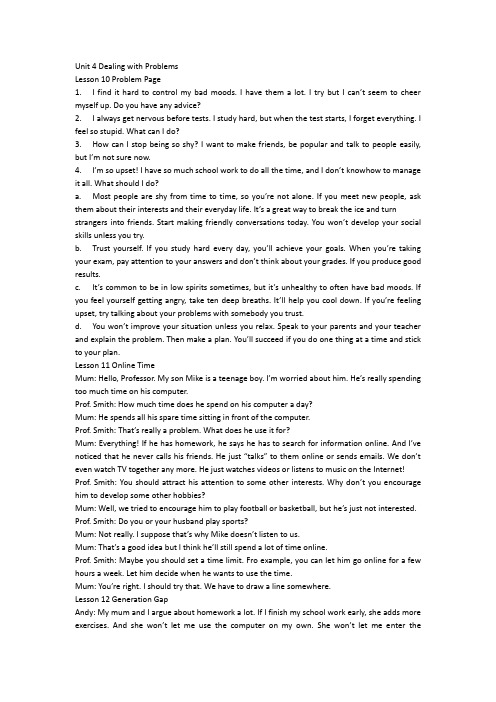
Unit 4 Dealing with ProblemsLesson 10 Problem Page1. I find it hard to control my bad moods. I have them a lot. I try but I can’t seem to cheer myself up. Do you have any advice?2. I always get nervous before tests. I study hard, but when the test starts, I forget everything. I feel so stupid. What can I do?3. How can I stop being so shy? I want to make friends, be popular and talk to people easily, but I’m not sure now.4. I’m so upset! I have so much school work to do all the time, and I don’t knowhow to manage it all. What should I do?a. Most people are shy from time to time, so you’re not alone. If you meet new people, ask them about their interests and their everyday life. It’s a great way to break the ice and turn strangers into friends. Start making friendly conversations today. You won’t develop your social skills unless you try.b. Trust yourself. If you study hard every day, you’ll achieve your goals. When you’re taking you r exam, pay attention to your answers and don’t think about your grades. If you produce good results.c. It’s common to be in low spirits sometimes, but it’s unhealthy to often have bad moods. If you feel yourself getting angry, take ten deep breaths. It’ll help you cool down. If you’re feeling upset, try talking about your problems with somebody you trust.d. You won’t improve your situation unless you relax. Speak to your parents and your teacher and explain the problem. Then make a plan. You’ll succeed i f you do one thing at a time and stick to your plan.Lesson 11 Online TimeMum: Hello, Professor. My son Mike is a teenage boy. I’m worried about him. He’s really spending too much time on his computer.Prof. Smith: How much time does he spend on his computer a day?Mum: He spends all his spare time sitting in front of the computer.Prof. Smith: That’s really a problem. What does he use it for?Mum: Everything! If he has homework, he says he has to search for information online. And I’ve noticed that he never calls his friends. He just “talks” to them online or sends emails. We don’t even watch TV together any more. He just watches videos or listens to music on the Internet! Prof. Smith: You should attract his attention to some other interests. Why don’t you encourage him to develop some other hobbies?Mum: Well, we tried to encourage him to play football or basketball, but he’s just not interested. Prof. Smith: Do you or your husband play sports?Mum: Not really. I suppose that’s why Mike doesn’t listen t o us.Mum: That’s a good idea but I think he’ll still spend a lot of time online.Prof. Smith: Maybe you should set a time limit. Fro example, you can let him go online for a few hours a week. Let him decide when he wants to use the time.Mum: You’re righ t. I should try that. We have to draw a line somewhere.Lesson 12 Generation GapAndy: My mum and I argue about homework a lot. If I finish my school work early, she adds more exercises. And she won’t let me use the computer on my own. She won’t let me enter thepassword myself. I’m not a little boy anymore.Susan: I’m proud of Andy. He’s a sweet, smart child, and he often gets praise from his teachers. But he’s a bit lazy so I have to be strict with him. I set a password on the computer so he can’t use it freely or spend too much time on it.Jessica: I love my mum but we argue a lot. S he says I’m always late and she says my phone bill is too high! I know she cares about me but I think she sometimes acts like she’s my boss. This causes problems between us.Karen: Jessica makes friends easily. She’s very popular among her classmates. But she has too many friends, and she spends hours on the phone! I’m not sure if these are the “right” friends for her. I let her go out on weekends but she often comes back late. She hasn’t grown up yet. Edward: My dad’s pretty cool. I can have friends come o ver to our house any time. We never argue except when he makes me clean my room. He often says my room is in a mess and things are dirty, but I don’t think so. I like the way it is.George: I let Edward bring friends home whenever he wants. He can be messy sometimes. He never makes his bed and he hates tidying his room. He thinks he can find things more easily if they’re lying around.Communication WorkshopDear Aunt Ada,I’m a new student. Some girls in my class are not friendly to me although I tried to b e nice to them. I want to be friends with them but I’m too shy to talk to them. They never talk to me. No one helps me because I have no friends in class. Can you help me?Dear Linda,I am sorry to hear about your problems and hope I can help.Maybe the gi rls don’t understand you so they are not friendly to you. You don’t need to feel bad about yourself. How about joining a club? Maybe you can meet friends this way.If you are too shy to talk to people, they can’t get to know you. You can start by saying hi to some of your classmates and have some short conversations with them. It may be difficult at first but the more you try, the easier it will become.I hope my advice helps. Please write to me again if you need any more help.Aunt Ada。
Unit 4 Dealing with Problems
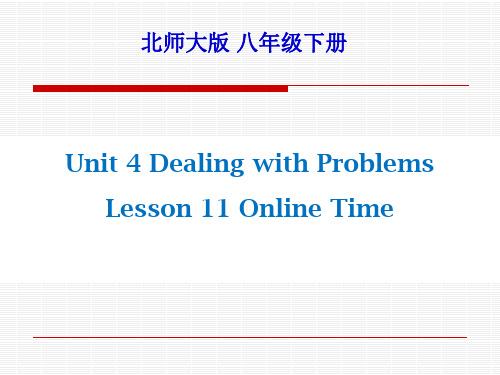
have learning difficulties
can’t communicate with parents
don't know how to improve English
be afraid of speaking in class
don’t know how to get on well with others
38% 30% 19% 8% 5%
Role play
Work in pairs, make a telephone call with professor Lin, tell him your problem and ask for some suggestions.
You can begin and end the dialogue like this:
Prof. Lin: Hello! A: Hello! Can I speak to professor Lin? Prof. Lin: Yes, this is Prof. Lin speaking. A: I can’t…/ I have difficulties in… Prof. Lin:…
4. Maybe you should set a _t_im__e_li_m_i_t .
Mike’s problem
He spends _t_o_o_m_u_c_h_t_i_m_e_ on_h_i_s _c_om__p_ut_e_r.
The professor’s suggestions
1.You should attract his attention to some other _i_nt_e_r_e_st_s__. 2.Why don’t you encourage him to develop some other _h_o_b_b_ie_s_.
【2020年独家】北师大版八年级英语下册课件:Unit 4 Dealing with Problems Lesson 10 Problem Page 第一课

Post-reading: Show achievements.
Show Time
You surely can • One of group members give us a presentation about your reply.
suggestion1 Trust yourself.
support1 You’ll achieve your goals if you
study hard.
suggestion2 Pay attention to your answers
and don’t think about your
grades.
While-reading: Make clear the 4 problems
Students’ problems
Problem1: hard to control bad moods Problem2: getting nervous before tests Problem3: being so shy Problem4: how to manage all school work
Ask about interests and everyday life
support1 Great way to break thesiilceencaend
turn strangers into friends. 1
suggestion2 Start conversation today.
2
3
Thinking more
• Which reply do you think is reasonable, yours or the reply on the textbook?
八年级英语下册 Unit 4 Dealing with Problems Lesson 10 Problem Page教案
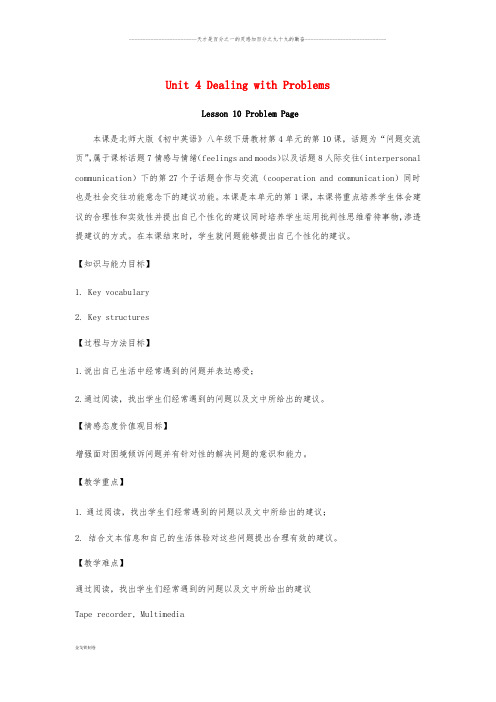
Unit 4 Dealing with ProblemsLesson 10 Problem Page本课是北师大版《初中英语》八年级下册教材第4单元的第10课,话题为“问题交流页”,属于课标话题7情感与情绪(feelings and moods)以及话题8人际交往(interpersonal communication)下的第27个子话题合作与交流(cooperation and communication)同时也是社会交往功能意念下的建议功能。
本课是本单元的第1课,本课将重点培养学生体会建议的合理性和实效性并提出自己个性化的建议同时培养学生运用批判性思维看待事物,渗透提建议的方式。
在本课结束时,学生就问题能够提出自己个性化的建议。
【知识与能力目标】1. Key vocabulary2. Key structures【过程与方法目标】1.说出自己生活中经常遇到的问题并表达感受;2.通过阅读,找出学生们经常遇到的问题以及文中所给出的建议。
【情感态度价值观目标】增强面对困境倾诉问题并有针对性的解决问题的意识和能力。
【教学重点】1.通过阅读,找出学生们经常遇到的问题以及文中所给出的建议;2. 结合文本信息和自己的生活体验对这些问题提出合理有效的建议。
【教学难点】通过阅读,找出学生们经常遇到的问题以及文中所给出的建议Tape recorder, MultimediaStep 1. Warm-upSs answer the questions with the help of the pictures.Q1: What problems do they have?Show some pictures.Step 2. Pre-reading1. T introduces the task to the Ss and activates them. Q1: Would you like to take part in the activity?2. Ss understand why they need to solve problems.Q1: What problems have you got?Q2: How do you feel?3. Ss guess their common problems according to a survey. Q: Can you guess which ones are common for us?4. Ss look at the result of the survey.Q: Are the problems also common for other students?Step 3. Reading1 1st reading:Ss get the problems that others have.Read and underline them.Understand the problems by choosing the videos.Ss give their own replies in groups.Ss choose the problem that they want to solve.Ss work in groups to discuss and then write their reply down.Ss show their replies.2.2.nd reading:Ss read for the proper reply and find out the suggestions and structures by themselves.Ss read the reply part and choose the proper reply on the problem they chose,Ss work in groups to find out the suggestions and structure of the reply.Q1: How many suggestions does somebody else give?Q2: What are they?Q3:What are the relationships between sentences?Ss show their ideas on suggestions and relationships.Ss summarize how to give a reply.Step 4.Work in pairs1. Ss use critical thinking to think more.Ss compare their reply with the reply on the textbook to evaluate which one is reasonable and tell why.Q: Which reply do you think is reasonable, yours or the reply on the textbook?Ss think about whether the suggestions on the textbook are enough to solve the problems.Q: Do you think the suggestions on the textbook are enough to solve the problems?2. Ss work in groups to perfect their replies and then show them in class.T presents the task and shows the evaluation form to Ss.Ss work in groups to perfect their reply.Ss show their replies in class.One of the group members gives the class a presentation according to their reply. After listening, other Ss evaluate the reply and write down one most usefulsuggestion.T encourages Ss to help others. They are good helpers.Step 5 ExciseRead the problems (1-4) and match them with the suggestions (a-d). Check the answers.Step 6 Homework1. Read the text.2. Write down your suggestions.略。
北师大英语八下课件:Unit 4 Dealing with Problems 10 课时1

While-reading: Make clear the 4 problems
Students’ problems
Problem1: hard to control bad moods Problem2: getting nervous before tests Problem3: being so shy Problem4: how to manage all school work
• Write one suggestion that you think is
sthoe mmosteudsefauly. !
Self-evaluation
I have talked about my □ problem.
□
□
I have talked about at □ least one suggestion.
While-reading: Focus on the same problems
The result of the survey:
While-reading: Join favorite group
Helping Groups
Getting nervous before exams1
Being so shy 1
While-reading: Get the structure and relationship.
Problem1: hard to control bad moods
fact It’s common to be in low spirits sometimes…comfort
suggestion1 Take ten deep breaths if you feel … useful
最新北师大版八年级英语下册课件:Unit 4 Dealing with Problems Lesson 10 Problem Page 第一课时

1
2
support2 If you worry too much, it won’t 3
help you progdeutce good results.
4
Problem3:tion1
Most people are shy from time to
time, so you’re not alone. comfort
explain your problem.
suggestion3 Make a plan.
1
suggestion4 You ‘ll succeed if you do one
2
thing at a time and stick to your
3
plan. encouragement
4
While-reading: Review the structure.
•Work in groups to: 1. Discuss your replies on the problem you chose. 2. Write them down on the paper. 3. Choose one to show the reply. •Attention: 1. Everyone should at least give one suggestion. 2. You can use phrases to show your ideas.
Their suggestions are □ useful. The reply is reasonable. □
The reply is clear.
□
□
□
□
□
□
□
□
□
初中英语北师大版八年级下册《Unit 4 Dealing with Problems Lesson
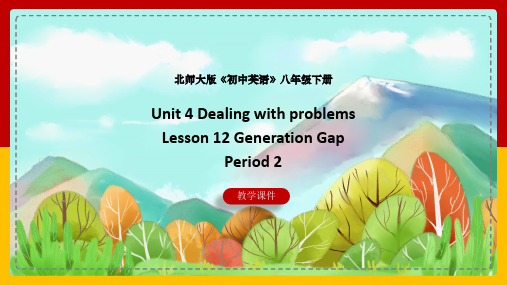
Choose the better choice according to the context.
• Jim: I want to play loud music. My parents say “ No”
• What does Jim’s mom mean? A: His mom doesn’t allow him to play loud music. Maybe it is bad for his ears. B: He mustn’t play loud music.
Read and underline the sentences in the text book.
Choose the problem that you want to solve and form a group.
Read the sentences.
• She won’t let me use the computer on my own. • She won’t let me enter the password. • We never argue except when he makes me clean my room. • I let her go out on weekends but she often comes back late. • I let Edward bring friends home.
What tasks are we going to finish?
• A lot of teenage students have some problems with their parents. Andy, Jessica, Edward showed their problems in our text book. Would you like to help some of them? What problems do you argue with your parents? Do you have good ideas to solve it?
初中英语北师大版八年级下册《Unit 4 Dealing with Problems Lesson

encouragements
How to show your sympathy and comfort: Most people are shy from time to time... It’s common to ... Don’t worry about... I have that problem sometimes. ...
While-writing: Work out the outline
Time limits in 5 minutes
While-writing: Finish the reply.
Time limits in 8 minutes
Sympathy & comfort Suggestions
Supports
Sentences with if or unless in our text: 1. If you meet new people, ask them about their interests
and their everyday life. 2. You won’t develop your social skills unless you try. 3. If you study hard every day, you’ll achieve your goals. 4. If you worry too much, it won’t help you produce good
new words. 5. Time limited in 15 minutes: 5mins for outline and 10mins for the whole
reply.
What makes a good reply?
ProblemPage教案(北师大版)

Unit 4 Dealing with ProblemsLesson 10 Problem Page教学指导思想通过英语学习使学生形成初步的综合语言运用能力,促进心智发展,提高综合人文素养。
英语课程提倡采用既强调语言学习过程又有利于提高学生学习成效的语言教学途径和方法,尽可能多地为学生创造在真实语境中运用语言的机会。
综合语言运用能力的形成应根据初中生认知能力发展的特点和学业发展的需求,在进一步发展学生综合语言运用能力的基础上,着重提高学生用英语获取信息、处理信息、分析问题和解决问题的能力,形成健全的情感、态度、价值观。
在语言技能目标(五级)中对阅读技能的目标要求学生能理解理解段落中各句子之间的逻辑关系;能根据不同的阅读目的运用简单的阅读策略获取信息。
在情感态度目标(五级)中要求学生能在英语交流中注意并理解他人的情感以及积极与他人合作,相互帮助,共同完成学习任务。
教学内容分析本课话题为“问题交流页”,属于课标话题7情感与情绪(feelings and moods)以及话题8人际交往(interpersonal communication)下的第27个子话题合作与交流(cooperation and communication)同时也是社会交往功能意念下的建议功能。
本课将重点培养学生体会建议的合理性和实效性并提出自己个性化的建议同时培养学生运用批判性思维看待事物,渗透提建议的方式。
在本课结束时,学生就问题能够提出自己个性化的建议。
第一课时以帮助同班同学解决问题为主线,侧重通过一系列的活动活跃学生思维。
首先通过提问学生你有什么问题使学生联系实际并激活其已知,在语境中体会表达感受的词汇。
然后展示课前调查问卷的结果并引出书中的问题。
学生阅读四个问题段落,画出问题并利用选择相应的视频来检测学生是否读懂问题。
随后根据学生意愿,想帮忙解决哪个问题,进行分组,拉近学生与课堂之间的距离。
在第二遍阅读中,学生阅读对应的建议并就建议和句子关系尝试进行总结,使学生在“辩”中学;同时理解课文内容,渗透支撑句的作用。
2019期八年级英语第二学期 Unit 4 Dealing with Problems Lesson 10 Problem Page教案
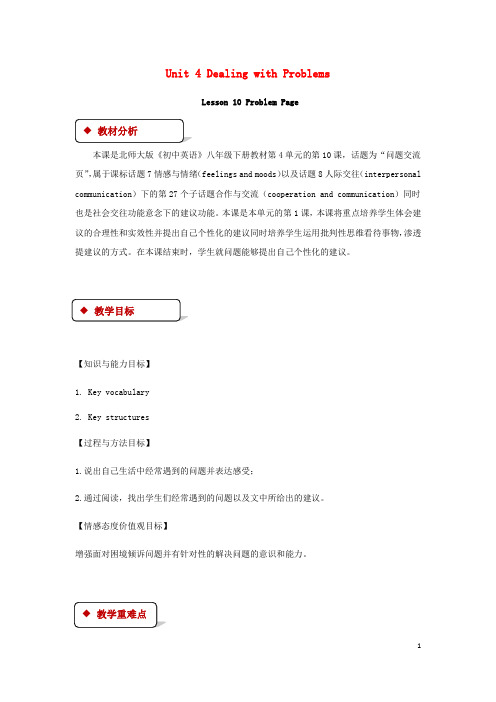
Unit 4 Dealing with ProblemsLesson 10 Problem Page本课是北师大版《初中英语》八年级下册教材第4单元的第10课,话题为“问题交流页”,属于课标话题7情感与情绪(feelingsand moods )以及话题8人际交往(interpersonal communication )下的第27个子话题合作与交流(cooperation and communication )同时也是社会交往功能意念下的建议功能。
本课是本单元的第1课,本课将重点培养学生体会建议的合理性和实效性并提出自己个性化的建议同时培养学生运用批判性思维看待事物,渗透提建议的方式。
在本课结束时,学生就问题能够提出自己个性化的建议。
【知识与能力目标】1. Key vocabulary2. Key structures【过程与方法目标】1.说出自己生活中经常遇到的问题并表达感受;2.通过阅读,找出学生们经常遇到的问题以及文中所给出的建议。
【情感态度价值观目标】增强面对困境倾诉问题并有针对性的解决问题的意识和能力。
【教学重点】1.通过阅读,找出学生们经常遇到的问题以及文中所给出的建议;2. 结合文本信息和自己的生活体验对这些问题提出合理有效的建议。
【教学难点】通过阅读,找出学生们经常遇到的问题以及文中所给出的建议Tape recorder, MultimediaStep 1. Warm-upSs answer the questions with the help of the pictures. Q1: What problems do they have?Show some pictures.Step 2. Pre-reading1. T introduces the task to the Ss and activates them.Q1: Would you like to take part in the activity?2. Ss understand why they need to solve problems.Q1: What problems have you got?Q2: How do you feel?3. Ss guess their common problems according to a survey.Q: Can you guess which ones are common for us?4. Ss look at the result of the survey.Q: Are the problems also common for other students?Step 3. Reading1 1st reading:Ss get the problems that others have.Read and underline them.Understand the problems by choosing the videos.Ss give their own replies in groups.Ss choose the problem that they want to solve.Ss work in groups to discuss and then write their reply down.Ss show their replies.2.2.nd reading:Ss read for the proper reply and find out the suggestions and structures by themselves.Ss read the reply part and choose the proper reply on the problem they chose,Ss work in groups to find out the suggestions and structure of the reply.Q1: How many suggestions does somebody else give?Q2: What are they?Q3:What are the relationships between sentences?Ss show their ideas on suggestions and relationships.Ss summarize how to give a reply.Step 4.Work in pairs1. Ss use critical thinking to think more.Ss compare their reply with the reply on the textbook to evaluate which one is reasonable and tell why.Q: Which reply do you think is reasonable, yours or the reply on the textbook?Ss think about whether the suggestions on the textbook are enough to solve the problems.Q: Do you think the suggestions on the textbook are enough to solve the problems?2. Ss work in groups to perfect their replies and then show them in class.T presents the task and shows the evaluation form to Ss.Ss work in groups to perfect their reply.Ss show their replies in class.One of the group members gives the class a presentation according to their reply.After listening, other Ss evaluate the reply and write down one most useful suggestion.T encourages Ss to help others. They are good helpers.Step 5 ExciseRead the problems (1-4) and match them with the suggestions (a-d).Check the answers.Step 6 Homework1. Read the text.2. Write down your suggestions.略。
Unit4DealingwithAIDS课文翻译综合教程一
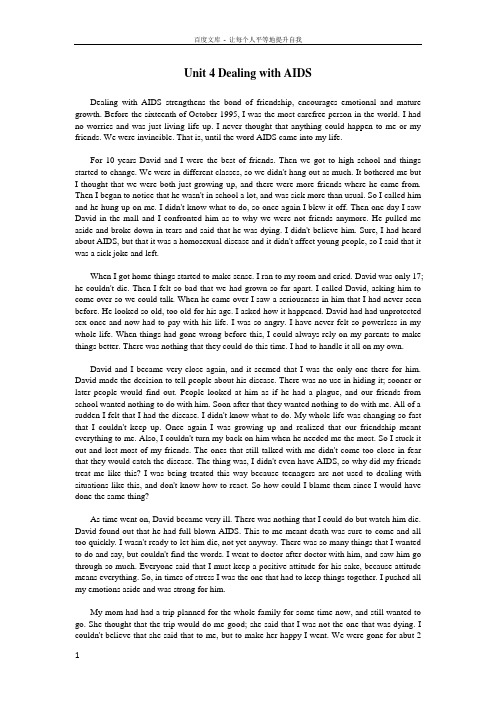
Unit 4 Dealing with AIDSDealing with AIDS strengthens the bond of friendship, encourages emotional and mature growth. Before the sixteenth of October 1995, I was the most carefree person in the world. I had no worries and was just living life up. I never thought that anything could happen to me or my friends. We were invincible. That is, until the word AIDS came into my life.For 10 years David and I were the best of friends. Then we got to high school and things started to change. We were in different classes, so we didn't hang out as much. It bothered me but I thought that we were both just growing up, and there were more friends where he came from. Then I began to notice that he wasn't in school a lot, and was sick more than usual. So I called him and he hung up on me. I didn't know what to do, so once again I blew it off. Then one day I saw David in the mall and I confronted him as to why we were not friends anymore. He pulled me aside and broke down in tears and said that he was dying. I didn't believe him. Sure, I had heard about AIDS, but that it was a homosexual disease and it didn't affect young people, so I said that it was a sick joke and left.When I got home things started to make sense. I ran to my room and cried. David was only 17; he couldn't die. Then I felt so bad that we had grown so far apart. I called David, asking him to come over so we could talk. When he came over I saw a seriousness in him that I had never seen before. He looked so old, too old for his age. I asked how it happened. David had had unprotected sex once and now had to pay with his life. I was so angry. I have never felt so powerless in my whole life. When things had gone wrong before this, I could always rely on my parents to make things better. There was nothing that they could do this time. I had to handle it all on my own.David and I became very close again, and it seemed that I was the only one there for him. David made the decision to tell people about his disease. There was no use in hiding it; sooner or later people would find out. People looked at him as if he had a plague, and our friends from school wanted nothing to do with him. Soon after that they wanted nothing to do with me. All of a sudden I felt that I had the disease. I didn't know what to do. My whole life was changing so fast that I couldn't keep up. Once again I was growing up and realized that our friendship meant everything to me. Also, I couldn't turn my back on him when he needed me the most. So I stuck it out and lost most of my friends. The ones that still talked with me didn't come too close in fear that they would catch the disease. The thing was, I didn't even have AIDS, so why did my friends treat me like this? I was being treated this way because teenagers are not used to dealing with situations like this, and don't know how to react. So how could I blame them since I would have done the same thing?As time went on, David became very ill. There was nothing that I could do but watch him die. David found out that he had full blown AIDS. This to me meant death was sure to come and all too quickly. I wasn't ready to let him die, not yet anyway. There was so many things that I wanted to do and say, but couldn't find the words. I went to doctor after doctor with him, and saw him go through so much. Everyone said that I must keep a positive attitude for his sake, because attitude means everything. So, in times of stress I was the one that had to keep things together. I pushed all my emotions aside and was strong for him.My mom had had a trip planned for the whole family for some time now, and still wanted to go. She thought that the trip would do me good; she said that I was not the one that was dying. I couldn't believe that she said that to me, but to make her happy I went. We were gone for abut 2weeks, and when I came back the first thing I did was go to see David. That was when I saw AIDS for the first time. I didn't even recognize him. David had lost weight, had purple lesions all over his body, and was very pale. He couldn't even get up when he saw me. He was bedridden. I still had to be the strong one and keep everything in. I had brought him stuff from the ocean, his favorite place. We talked about my trip and anything else we could think of. Then he fell asleep because he could no longer stay awake for long periods of time.On the second of May 1996, David was put in the hospital. This gave him the feeling that there was no more hope left, and that he was going to die. I still had to maintain my positive outlook for him. He needed that in me. One day he looked at me and said, "Faye, I am dying; let's accept that and deal with it. I know what I did was wrong and now I have to deal with it. All I want you to do is to remember me, enjoy life and be careful." For the first time in front of him, I cried. I knew that it wouldn't be long before he was gone forever. He shouldn't have to deal with this at such a young age. Towards the end of May he became so sick that the hospital staff had a bubble around him, so he wouldn't catch our bad germs. I hated to see him like that, and every day it became worse. I had come to realize that any day now he would die. At night I would wonder if he would make it through. School was over now, so I spent every hour I could in the hospital. He was everything to me. I felt bad for the time that we had lost and how I wasn't even going to fight for our friendship.The fifth of June, 1996 marked the end of my best friend David's life. He went peacefully. That was a comfort all in its own. In a way I was glad that it was over, for he was no longer in pain. All the emotions that I had held in came rushing out as I realized that I would never see David again. His mother said that I had kept him alive and that she was grateful that I was her son's last friend. It hasn't been a year yet, but I have done so much since then that I am no longer that carefree teenager. I now educate people about AIDS, which to me is keeping David's memory alive. Even though David is gone, he is still with me and always will be in mind and spirit.应对艾滋病抵抗艾滋病可以加深友谊,增进情感交流和促进人们成熟。
2018秋期八年级英语下册Unit4DealingwithProblemsLesson
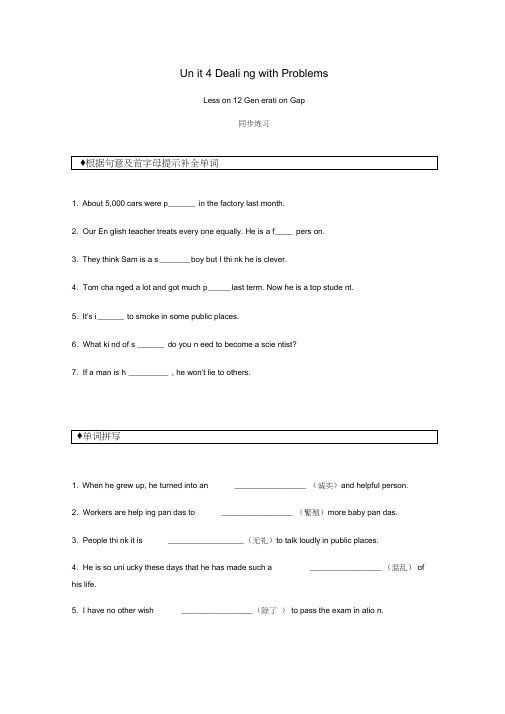
Un it 4 Deali ng with ProblemsLess on 12 Gen erati on Gap同步练习1. About 5,000 cars were p ______ in the factory last month.2. Our En glish teacher treats every one equally. He is a f ____ pers on.3. They think Sam is a s _______ b oy but I thi nk he is clever.4. Tom cha nged a lot and got much p _____ last term. Now he is a top stude nt.5. It's i ______ to smoke in some public places.6. What ki nd of s ______ do you n eed to become a scie ntist?7. If a man is h _________ , he won't lie to others.1. When he grew up, he turned into an ________________ (诚实)and helpful person.2. Workers are help ing pan das to ________________ (繁殖)more baby pan das.3. People thi nk it is _________________ (无礼)to talk loudly in public places.4. He is so uni ucky these days that he has made such a ________________ (混乱) of his life.5. I have no other wish ________________ (除了) to pass the exam in atio n.226. Miss Weston is having difficulty in _______________________ (控制)the childrenclass.7. Although he died, his (精神)will live on. 8. _________________ (假定)you fail the math exam, what would you do?9. Daming can speak English ____________________ (相当地)well now.10. ( 无论何时)you need help, send me an e-mail or call me.1. --Has your team beaten theirs? __________ .A. ever; Not yetB. already; Yes, alreadyC. yet; Not everD. already; Not yet 2. the old woman was a little worried ,but then she felt quiet all right.A. From time to timeB. I n the endC. In the begi nningD. At the same time3. He his homework and now is listening to music.A. fini shedB. fini shesC. has fini shedD. was finishing4. Li Lei has n't come yet. I don't know what to him. ___________A. is happe nedB. has bee n take n placeC. has take n placeD. has happe ned5. Mr. Smith in America this time last year.in thatA. travelledB. would travelC. has travelledD. was travelli ng6. --What would you like to do, singing or dancing?--I choose you a song.A. sangB. singingC. to singD. sing7. Don't go out. I don't want you to ___A. get loseB. get missedC. get missD. get lost8. --I you good luck in the coming new year.--Tha nks.A. wantB. wishC. hopeD. like9. What he said about the life in that country isA. surpriseB. surprisedC. surpris ingD. to be surprised10. He ' s never visited France, ________ h e?A. isB. isn ' tC. hasD. hasn 'tAs young stude nts, you have many dreams. These dreams can be very big, such as winning the Nobel Prize; they can also be small, such as beco ming one of the best stude nts in your class.Once you find a dream, what do you do with it? Do you ever try to make your dream come true? How can you make your dream real?An drew Matthews, an Australia n writer, tells us that maki ng the dreams real islife's biggest challenge(挑战).You may think you're not very good at some schoolsubjects, or that it's impossible for you to become a winner. Those kinds of ideas stop you from realiz ing (实现)your dream.In fact, everyone can realize his dream. The first thing you must do is to remember what your dream is.3Don't let it leave your heart. Keep telling yourself what you want every day and then your dream will come true faster. You should know that a big dream is, in fact, made up of many small dreams.You must also never give up your dream. There will be difficulties on the road to your dreams, so it's hard for you to make your dream come true. But the biggest difficulty comes from yourself. You need to decide what to do and what not to do.根据短文内容,完成下列小题。
2018秋期八年级英语下册 Unit 4 Dealing with Problems Lesson
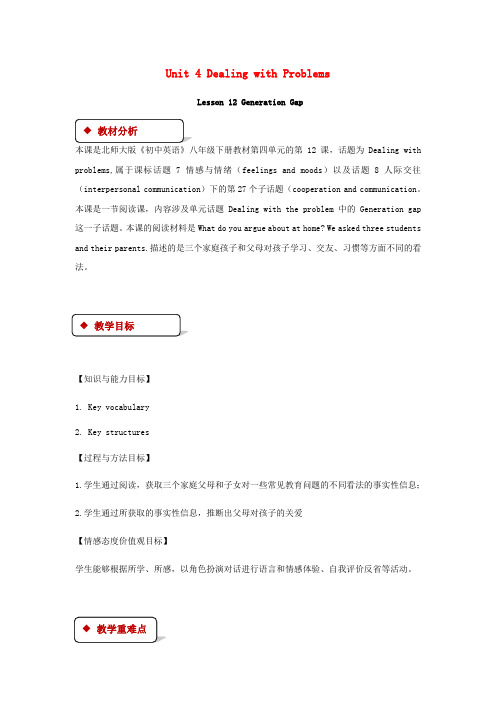
Unit 4 Dealing with ProblemsLesson 12 Generation Gap本课是北师大版《初中英语》八年级下册教材第四单元的第12课,话题为Dealing with problems,属于课标话题7情感与情绪(feelings and moods)以及话题8人际交往(interpersonal communication)下的第27个子话题(cooperation and communication。
本课是一节阅读课,内容涉及单元话题Dealing with the problem中的Generation gap 这一子话题。
本课的阅读材料是What do you argue about at home? We asked three students and their parents.描述的是三个家庭孩子和父母对孩子学习、交友、习惯等方面不同的看法。
【知识与能力目标】1. Key vocabulary2. Key structures【过程与方法目标】1.学生通过阅读,获取三个家庭父母和子女对一些常见教育问题的不同看法的事实性信息;2.学生通过所获取的事实性信息,推断出父母对孩子的关爱【情感态度价值观目标】学生能够根据所学、所感,以角色扮演对话进行语言和情感体验、自我评价反省等活动。
【教学重点】通过听,获取、理解对话的相关信息。
【教学难点】学生通过所获取的事实性信息,推断出父母对孩子的关爱。
Tape recorder, MultimediaStep 1. Warm-upDraw Ss’attention to the topic of the less on by presenting the picture of their family photos by questions:Q1: Do you love your parents?Q2: Do your parents love you?Step 2 Pre-reading1.LSs talk about what problems they always argue with their parents by presentingthe survey.2.Ss talk about their feelings when they argue with their parents by questions:Q1: When you argue with your parents, are you happy?Q2: Are you parents happy?3.Ss think why we always argue with our parents by answering questionsQ1: What kind of family life would you like to live?22Q2: Why do you sometimes argue?Step 3. ReadingPart 11. Read for the general information.Ss read quickly to guess what might be in a passage by reading the pictures, title and the bold words to encourage Ss toSs are trained fast reading skills by the key words with the help of questions.Q1: Who are three students?Q2: Who are three parents?Ss re-construct the structure of passage with the help of questions.Q1: Which part are the students talking about?Q2: Which part are the parents talking about?2. Read for the detailed information.Part 21. Ss get and understand the detailed information with the help of the questions.Q1:What problems do they argue with their parents?2. Ss check the answers by presenting it on PPT.3. Ss share how they feel their parents with the help of questions.Q1: Do you have the same problem like theirs?Q2: When your parents argue about these things with you , how do you feel?Q3: How about the three students?Q4: Are they satisfied with their parents?Q5: What do they think of their parents?Step 4. Work in pairs1 Work with your partner to recall (回忆)the problems and suggestions.32.Ss understand the task by reading the reportA lot of teenage students have some problems with their parents. Andy, Jessica, Edward showed their problems in our text book. Would you like to help some of them?Step 5 Homework1. Read the text carefully.2. Design your own Problem Page略。
- 1、下载文档前请自行甄别文档内容的完整性,平台不提供额外的编辑、内容补充、找答案等附加服务。
- 2、"仅部分预览"的文档,不可在线预览部分如存在完整性等问题,可反馈申请退款(可完整预览的文档不适用该条件!)。
- 3、如文档侵犯您的权益,请联系客服反馈,我们会尽快为您处理(人工客服工作时间:9:00-18:30)。
Lesson 12 Generation Gap
First Part:Words!
间 隔
代沟
家务
增加
密码
杂乱
老板
严厉的
懒惰的
长大
关心,在意
独自
无论何时
Second Part: Pronunciation!
Can
Fourth Part: Listening!
课后请认真朗读所听过的听
力材料!
请听对话材料,完成书中所
附听力练习!
课下认真朗读本 单元单词及对话!
Third Part: Vocabulary!
Complete the sentences!
4. I’ll try to ____ ____ ____ 引起他的注 意 s he leaves the meeting. 5. The style of jeans is ____ ____ ____ 过 时的. 6. Bill made so many troubles, so he had no c______ except to leave.
you pronounce the key words in this lesson? Read them aloud and communicate with your classmates!
Third Part: Vocabulary! Complete the sentences!
1.My mother ____ ____ ____ 对……感到 意 this silver necklace so that she bought it immediately. 2.She is clever ____ ____ ____ 除……之外也 beautiful. Her teachers like her very much. 3. This pair of socks____ ____ ____ 对… …合适 my daughter.
Compltisfied with 2. As well as 3. are suitable for 4. Catch his eye 5. Out of style/fashion 6. Choice
1.generation 2.housework 3.gap 4.add 5.pretty 6.mess 7.praise zy
1.generat_on 2.house_ork 3.g_p 4._dd 5.pre_ty 6._ess 7.p_aise 8.l_zy
Can you make sentences with the words above ? 请用以上新学单词造句!
Third Part: Vocabulary!
